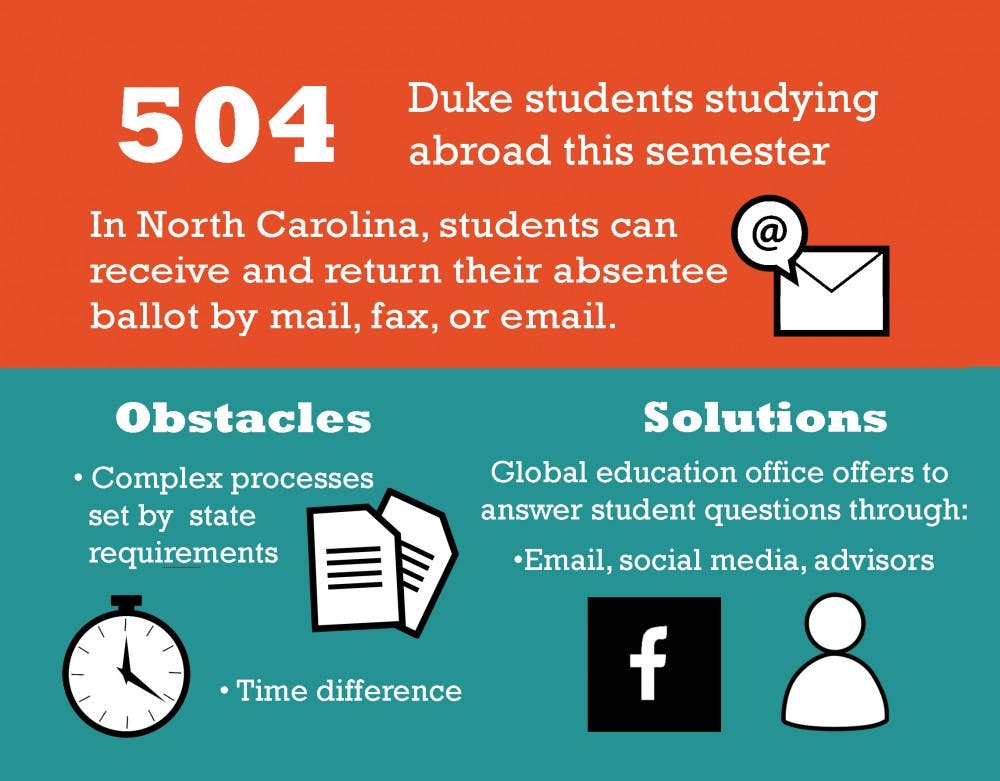While Duke students begin early voting Thursday, several others have already cast ballots—but from locations even more inconvenient than Devil’s Den.
For the 504 students studying abroad this semester, casting a ballot is made possible through absentee voting, a process that varies between states. North Carolina allows overseas citizens to fill out an application requesting an absentee ballot to be sent to them by mail, fax or email, which students can return the same way.
Although it took a long time to receive the ballot from the Durham County Board of Elections, the process went smoothly overall, said Marissa Farbman, a junior studying in Spain this Fall.
“I’ve been pleasantly surprised by North Carolina’s process for voting abroad or voting overseas because they have an option to email you a ballot,” she said.
Junior Anna Huck, who also cast a North Carolina absentee ballot, echoed this sentiment.
“They received it, I voted, and it was super easy,” Huck said.
Unlike North Carolina, some states require absentee ballots to be physically mailed, which can complicate the process. Junior Liz Brown, who authored a blog post in September for the Office of Global Education about voting abroad, noted that the biggest obstacles for students might be deciphering the varied requirements from different states.
“A lot of people, me included, feel like you’ve registered to vote more than once, you don’t know what the right address is, there’s just so many little bureaucratic details that have to be correct that you don’t want to mess it up,” she said.
Brown noted that email transmission of ballots still could be challenging if printing is not readily available abroad in order to actually fill out the ballot.
"At some point, you do have to print something out which is definitely such a deterrent,” she said. “We’re such digital people now no one wants to go print it out.”
In an effort to minimize complexity of voting for students studying abroad, the Global Education Office has taken action to provide resources for students looking to cast absentee ballots.
“The Global Education Office has no way of knowing how many students abroad are registered to vote, where they are registered to vote or how many will choose to vote, but we are trying to give students the tools and information necessary to make voting at a distance a possibility,” wrote Amanda Kelso, executive director of the GEO, in an email.
Kelso noted that the GEO has offered online resources to students through email and social media and has also supplied advisors with resources to answer students' questions.
The biggest obstacle for students voting abroad is meeting deadlines, Kelso wrote.
“We know students are very busy while abroad, and perhaps not thinking about U.S. elections as much, so we take the responsibility to keep students informed about the voting process very seriously,” she wrote.
The application for a North Carolina absentee ballot must be filed by Nov. 1. As for returning the absentee ballot, it must be sent by Nov. 8. and received by a county board of elections by Nov. 14. to be valid.
Brown said that students are excited to vote because for most of them, it is the first presidential election they are eligible to vote in. She added that logistics, not apathy, cause most of the challenges of voting abroad.
“I don’t think it’s a deterrent at all that people don’t think their voice is going to count,” Brown said. “I haven’t heard anyone be like 'I’m not going to absentee vote because it doesn’t matter anyway.' The general sentiment has just been 'I need to do that, I just keep forgetting.' It’s complicated.'”
Several students reported feeling temporarily detached from the election because of time differences.
“I definitely feel like I am distanced from it, like it’s this otherworldly reality that will not affect me in any way even though I know it’ll affect me when I get back,” Huck said.
Farbman, who is six hours ahead of Eastern Standard Time in her study abroad location, noted that following election coverage from afar has given her a unique take on the election and on when candidates' comments are being misconstrued.
“I haven’t stayed up any night to watch the debate, so the next morning I first usually see news headlines,” she said. “So it’s kind of interesting doing it in the reverse order—seeing the commentary and then actually hearing what the candidates say.”
Because social media comments are not necessarily reflective of in-person dialogue at Duke, she said she is looking forward to in person discussions upon returning to campus.
“There are a lot of concerns happening in North Carolina,” she said. “I’m curious to know more how campus feels, so I wish I could be there just to get that sense.”
Information about how to register to vote and vote from abroad can be found at the Federal Voting Assistance Program website.
Heather Zhou contributed reporting.
Get The Chronicle straight to your inbox
Signup for our weekly newsletter. Cancel at any time.

